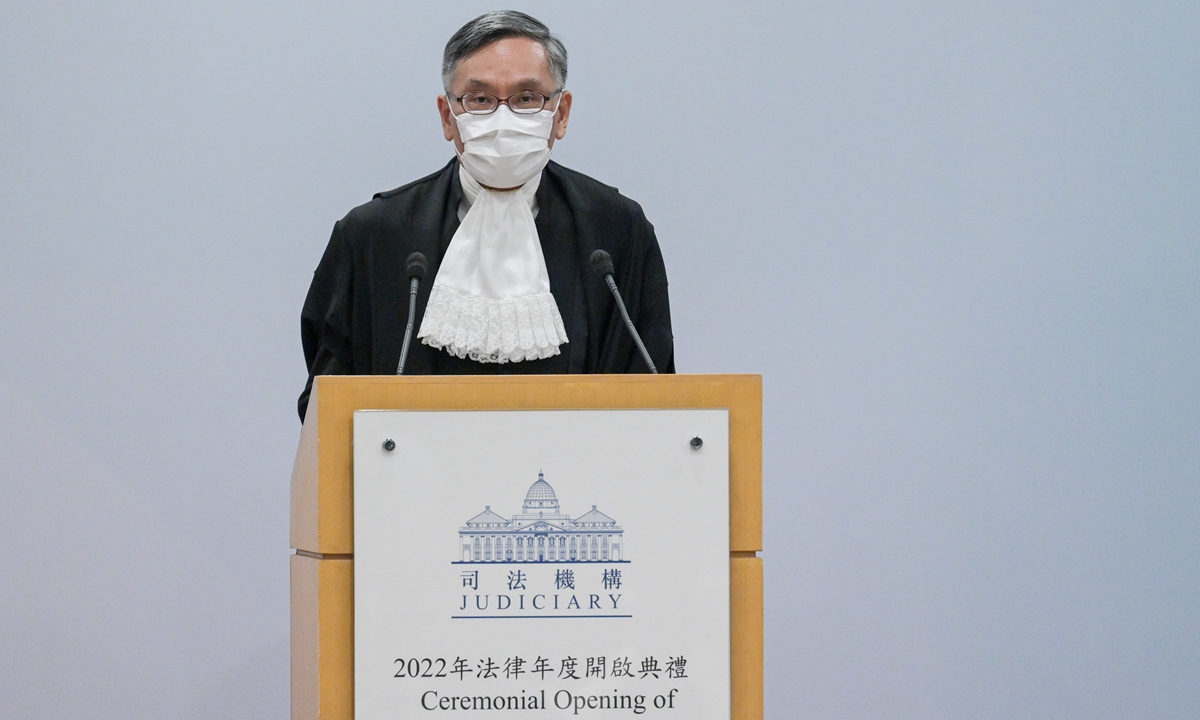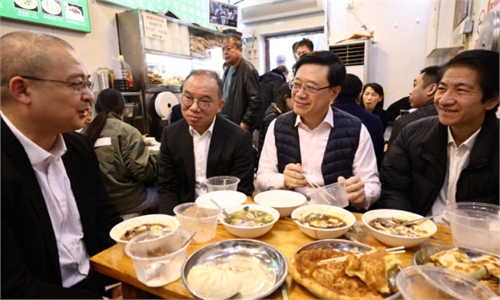HK judiciary delegation visits mainland, to enhance cooperation, mutual understanding

The HKSAR Chief Justice of the Court of Final Appeal Andrew Cheung Kui-nung meets the media on January 24, 2022. Photo: VCG
A judiciary delegation led by the chief justice of the Hong Kong Special Administrative Region (HKSAR) kicked off a visit to the Chinese mainland on Monday. The visit reflects wishes to enhance mutual trust and cooperation in judicial systems and is of great significance to Hong Kong, observers noted.
During this trip, the city's Chief Justice of the Court of Final Appeal Andrew Cheung Kui-nung is leading a judiciary delegation to visit Guangzhou, Shenzhen and Zhuhai, three cities in the Guangdong-Hong Kong-Macao Greater Bay Area from Monday to Wednesday, according to a press release of the HKSAR government.
During the visit, which is part of the ongoing exchanges between the city's judiciary and the Chinese mainland courts, the delegation is set to meet with vice president of the Supreme People's Court, Yang Wanming, visit court facilities in these cities, attend forums and have professional exchanges with mainland judges and judicial staff on court operation matters and other judicial issues, according to the press release.
The exchange mission can deepen the understanding of judicial personnel between the mainland and Hong Kong, especially helping the judicial sector in Hong Kong to better understand the national legal code and the achievements of judicial reform in the mainland, which is conducive to the improvement of judicial assistance and integrated rule of law between two sides, as well as promoting the integration of Hong Kong into the overall development of the country, Wu Yingpeng, a lawyer and barrister-at-law in Hong Kong, told the Global Times on Monday.
It is a very good start for Hong Kong to send a judicial delegation to visit the mainland cities for reciprocal judicial exchanges, Fan Peng, a research fellow at the Chinese Academy of Social Sciences' Institute of Political Sciences, told the Global Times on Monday.
"This visit reflects the determination of both sides to enhance mutual trust and cooperation through exchanges, and is of great significance especially after the 20th National Congress of the Communist Party of China (CPC) and the 2023 two sessions," Fan said.
He noted that as Hong Kong is now in a critical stage of recovery after the COVID-19 pandemic, and it is particularly important that it is launching in-depth exchanges with the mainland.
Strengthening communication and mutual trust in the judicial sector can create a very good legal foundation, institutional environment and political atmosphere for Hong Kong, observers noted.
The focus of the exchange may include the operation of the judicial process, legal system, the future bilateral cooperation mechanism, response mechanism and judicial exchange mechanism, Fan said. Through this exchange, more in-depth and all-round exchanges and cooperation between the judiciary of Hong Kong and the mainland are likely to become a reality.
The Hong Kong Bar Association will lead a 20-member delegation to Beijing in April, said Hong Kong Bar Association chairman Victor Dawes as quoted by the South China Morning Post.
Fan pointed out that due to some historical and political reasons, there are some preconceptions about the mainland judicial system among the Hong Kong judicial community and the general public. "This is an area that requires a lot of mutual communication and recognition from both sides," he said.
The progress of the judicial system in the mainland in recent years is what the Hong Kong judicial system may not have noticed, including judicial openness and internet-based justice, the experts said.
The mainland's building up of intelligent courts is also a worthy experience that Hong Kong can learn from, which can effectively improve trial efficiency and reduce judicial costs, Wu said.
Wu noted that he hopes that a regular mechanism of judicial exchange visits can be formed in the future.


